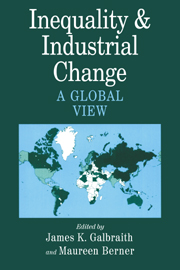Book contents
- Frontmatter
- Contents
- Contributors
- Permissions
- Acknowledgments
- PART I INTRODUCTION TO THEORY AND METHOD
- PART II INEQUALITY, UNEMPLOYMENT, AND INDUSTRIAL CHANGE
- PART III INEQUALITY AND DEVELOPMENT
- 7 Toward a New Kuznets Hypothesis: Theory and Evidence on Growth and Inequality
- 8 Measuring the Evolution of Inequality in the Global Economy
- 9 Economic Regionalization, Inequality, and Financial Crises
- 10 Inequality and State Violence: A Short Report
- 11 Grading the Performance of Latin American Regimes, 1970–1995
- 12 The Evolution of Industrial Earnings Inequality in Mexico and Brazil
- 13 The Legacy of the HCI: An Empirical Analysis of Korean Industrial Policy
- 14 Inequality and Economic Development: Concluding Reflections
- PART IV METHODS AND TECHNIQUES
- Data Appendix
- References and Selected Bibliography
- Index
14 - Inequality and Economic Development: Concluding Reflections
Published online by Cambridge University Press: 05 June 2012
- Frontmatter
- Contents
- Contributors
- Permissions
- Acknowledgments
- PART I INTRODUCTION TO THEORY AND METHOD
- PART II INEQUALITY, UNEMPLOYMENT, AND INDUSTRIAL CHANGE
- PART III INEQUALITY AND DEVELOPMENT
- 7 Toward a New Kuznets Hypothesis: Theory and Evidence on Growth and Inequality
- 8 Measuring the Evolution of Inequality in the Global Economy
- 9 Economic Regionalization, Inequality, and Financial Crises
- 10 Inequality and State Violence: A Short Report
- 11 Grading the Performance of Latin American Regimes, 1970–1995
- 12 The Evolution of Industrial Earnings Inequality in Mexico and Brazil
- 13 The Legacy of the HCI: An Empirical Analysis of Korean Industrial Policy
- 14 Inequality and Economic Development: Concluding Reflections
- PART IV METHODS AND TECHNIQUES
- Data Appendix
- References and Selected Bibliography
- Index
Summary
In a recent book on the determinants of economic growth, Robert Barro (1997) argues that global capitalism is characterized by conditional convergence: Poorer countries tend to grow more rapidly and thus to catch up with their developed neighbors and trading partners, provided that they equip themselves with appropriate institutions and policies. Barro points to significant statistical associations between schooling, public health, and democratic political institutions, on the one hand, and subsequent periods of strong economic growth on the other. He also argues that economic development tends to yield progress toward democracy over time.
Barro's work may be questioned on many empirical grounds. His data are heterogeneous and sometimes obscure, involving efforts to assign quantitative measures to qualitative phenomena (why, for instance, is South Africa's “index of democracy” three times higher than Tanzania's for 1975?). His casual remark that “non-democratic places that experience substantial economic development tend to become more democratic. Examples are Chile” (p. 61) suggests a perhaps tenuous grip on modern political history. And one can't help noticing that his predictions of high-growth “winners” for the period 1996–2000, including South Korea, Thailand, the Philippines, and Hong Kong, have been overtaken by the Asian crisis and its aftermath. Decidedly, statistical prediction in economic development can be a dangerous affair.
- Type
- Chapter
- Information
- Inequality and Industrial ChangeA Global View, pp. 256 - 260Publisher: Cambridge University PressPrint publication year: 2001
- 2
- Cited by



